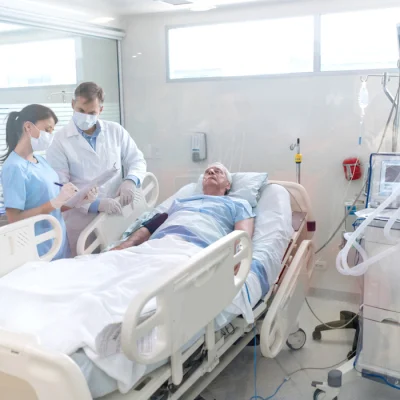Consequences of psychological distress in the ICU needs to be addressed, due to the frequent occurrence of anxiety, delirium, acute PTSD and depression in both patients and family members. By addressing these key issues healthcare costs and usage could be reduced.
Previously, it was thought that stress could be reduced through a paternalistic style of healthcare delivery. This includes restricting the number of visiting hours and the number of bedside visitors to benefit family members and high sedation for the benefit of the patient.
Alternative methods to reduce stress and anxiety amongst patients and family members now include unrestricted visiting hours in the ICU. It is thought that by increasing the access of family members, patients would be provided with additional support, the family can build trust with the ICU team and also separation anxiety presented in family members could be addressed. Another method is the introduction of ICU diaries, which documents the patient’s experience in the ICU, reducing anxiety and PTSD outcomes.
In a study published in JAMA, the benefits of the flexible family visiting model were analysed through randomised clinical trials. 36 ICUs in Brazil were studied to see the effects on delirium if family members were allowed up to 12 hours per day to visit patients compared to the 1.5 hours allowed for restricted visitations. The intervention group was also given information related to how the ICU environment works.
Results from the study found that the median length of time for visitation by family members per day was 4.8 hours, compared to 1.4 hours per day when visitations were restricted. This is less than half of the available time that family members were allowed to stay at the bedside for, however, it is possible to assume that this was due to prior commitments of the family members.
The study also found that there was no impact on the delirium outcomes of patients by increasing visiting hours. However, it should be noted that there was a decrease in the psychological distress of family members, as measured on the Hospital Anxiety and Depression Scale (HADS), and an increase in family satisfaction. Although, because the intervention group had also undergone training in the ICU setting it is unsure as to whether the family satisfaction results are due to this or the extended visiting hours. Also, although family members were given this ICU education, no strategies were reported to reduce cases of delirium. Researchers proposed more studies to be conducted on the effects that extended visiting hours have on delirium in patients considered severely ill, as more benefits may be reported in this cohort.
Another study published in JAMA examined the effects of ICU diary use in 35 French ICUs, in a randomised clinical trial. The ICU diaries were completed by family members and clinicians and given to the patient or a family member when nearing the time of their ICU discharge. 657 patients and their families were involved in the trial.
Results showed no difference in PTSD outcomes between the group who had been issued with a diary and those who had not. With 29.9% reporting PTSD in the intervention group and 34.3% in the control group after 90 days. The study also saw no difference in PTSD symptoms, anxiety or depression for family members of patients. Surprisingly, results also stated an increased risk of mortality in the intervention group, however researchers explained this difference was reduced at hospital discharge.
Researchers discussed that the possibility that PTSD occurrence measured for family members and patients; 46.4% and 32.2%, respectively; could have been underestimated. As the high rates of those who did not follow-up, almost 50% for patients and 14.6% for family members, could be a result of individuals being less likely to follow-up and return to the ICU if suffering from PTSD. Researchers linked this outcome to the paternalistic medical style of the ICU.
As the results from this study did not show any harm in the use of ICU diaries, ICUs already implementing them can be assured that patients will not be affected. However, it does not provide a convincing argument for ICUs to start adopting this method. It should be noted that the ICUs in which the trials were carried out were not familiar with ICU diaries before the trial and it is possible that the instructions for their implementation were not properly explained.
Difficulties remain in improving the psychological issues of both patients and their families, however, it is possible that other factors could have had an impact on the outcomes. Future studies need to examine the precision framework to appropriately risk-stratify those with psychological challenges post-discharge and tailor the interventions with varying intensities depending on the individual.
Source: JAMA Network
Image Credit: iStock










